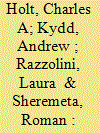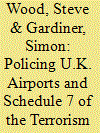| Srl | Item |
| 1 |
ID:
144800


|
|
|
|
|
| Summary/Abstract |
This article implements an experimental test of a game-theoretic model of equilibrium profiling. Attackers choose a demographic “type” from which to recruit, and defenders choose which demographic types to search. Some types are more reliable than others in the sense of having a higher probability of carrying out a successful attack if they get past the security checkpoint. In a Nash equilibrium, defenders tend to profile by searching the more reliable attacker types more frequently, whereas the attackers tend to send less reliable types. Data from laboratory experiments with financially motivated human subjects are consistent with the qualitative patterns predicted by theory. However, we also find several interesting behavioral deviations from the theory.
|
|
|
|
|
|
|
|
|
|
|
|
|
|
|
|
| 2 |
ID:
183027


|
|
|
|
|
| Summary/Abstract |
Policing airports following 9/11 has been challenging with an emphasis on visibility and high levels of security checks for passengers. The focus has been on a form of ‘reassurance policing’ and an emphasis on procedural justice which is accepted as legitimate on the part of the public. However, there have been claims that that Muslim passengers are under greater suspicion than other passengers and have been subject to the practice of “racial profiling”. The powers under the Terrorism Act 2000, notably Schedule 7, have been under scrutiny as to the extent that they allow the police to stop and search suspects. This study reviews the opinions and experiences of young passengers at U.K. airports to see if they are reassured by policing and their opinions on profiling fellow passengers.
|
|
|
|
|
|
|
|
|
|
|
|
|
|
|
|
| 3 |
ID:
069848


|
|
|
| 4 |
ID:
105994


|
|
|
|
|
| Publication |
2011.
|
| Summary/Abstract |
A key problem for counterterrorism is how large numbers of individuals can be screened most efficiently to discover terrorists. This question arises at security checkpoints of all kinds, from roadblocks to airline security counters. Some argue that certain categories of individuals, for instance, young Muslim men in the airline context, should be screened more heavily than others. Others deride this as racial profiling, and argue that any such scheme would be easily evaded. I examine a model of searching for terrorists among a population divided into categories that vary in their potential reliability or ease of recruitment as agents of terrorist attacks. The equilibria in the model feature profiling, in that different categories are searched with different intensities. Practical difficulties in implementing a rational profiling scheme are discussed.
|
|
|
|
|
|
|
|
|
|
|
|
|
|
|
|